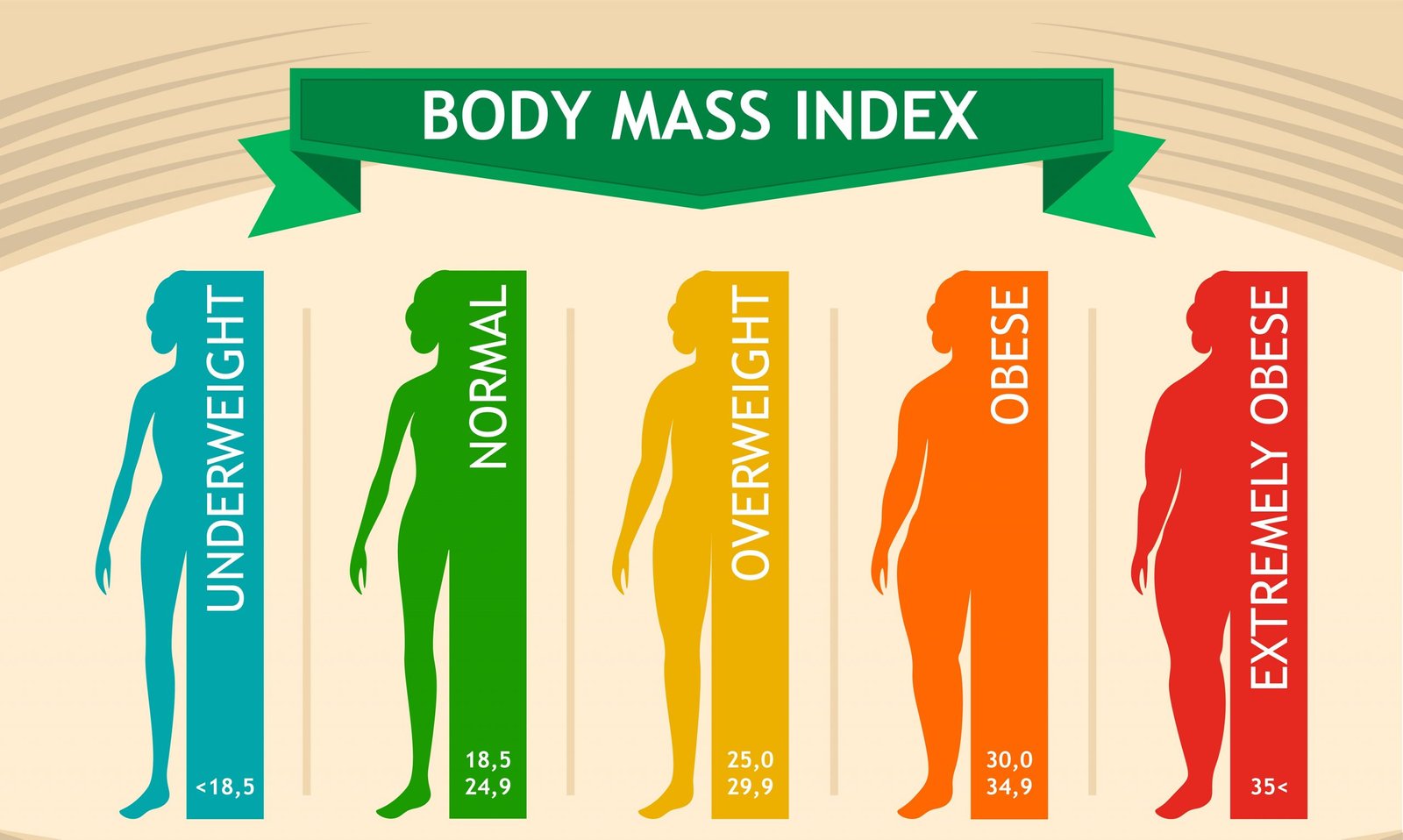What is BMI?
BMI (Body Mass Index) is a useful tool for understanding if we’re at a healthy weight based on our height. It’s kind of like a quick health check to see if we’re too skinny, just right, or carrying extra weight. Dr. Anil Batra, who works as a consulting physician in Bhopal, often relies on BMI to guide his patients toward better health. Here’s how it works: First, you step on a scale to measure your weight. Then, you use a measuring tape to find your height. Dr. Batra uses a special math formula that divides your weight in kilograms by your height in meters square. This gives you a number, which is your BMI.
Now, what does this number mean? If your BMI is low, it could mean you’re underweight and might need to eat more healthy foods to gain a bit of weight. If your BMI falls within the middle range, it usually means you’re at a healthy weight for your height. However, if your BMI is high, it might mean you’re carrying too much weight for your height. In that case, Dr. Batra might recommend eating healthier foods and doing more exercise to bring it down.
It’s important to remember that BMI is just one way to gauge your health. Dr. Batra also considers other factors such as your age, how active you are, and your overall health when helping you stay healthy. If you’re worried about your weight or health, it’s always a good idea to talk to a doctor like Dr. Batra. Being aware of your BMI can help you make informed choices to stay strong and feel your best!

How is BMI calculated?
Below are the steps that help you to calculate your BMI:
1. Measure Your Weight
Stand on a scale to find out how much you weigh. This is measured in kilograms (kg).
2. Measure Your Height
Use a measuring tape against a wall to determine how tall you are. This is measured in meters (m).
3. Formula Application
Dr. Anil Batra, a consulting physician in Bhopal, uses a specific formula to calculate BMI. It’s like a math equation: BMI = weight (in kg) / (height in meters)^2.
4. Example Calculation
Let’s say you weigh 50 kg and your height is 1.6 meters. To find your BMI, you divide 50 by (1.6 x 1.6). This gives you a BMI of approximately 19.5.
5. Interpreting Your BMI
Your BMI number tells you if you’re underweight, at a healthy weight, or overweight. Here’s what the numbers mean:
-
- A BMI below 18.5 suggests you might be underweight.
- A BMI between 18.5 and 24.9 is usually considered a healthy range.
- A BMI of 25 or higher may indicate you’re carrying extra weight, which could affect your health.
Dr. Anil Batra, a renowned consulting physician in Bhopal, looks at your BMI along with other factors like your age and activity level to give you advice on staying healthy. Understanding your BMI helps you make smart choices about eating well and staying active to keep your body strong and healthy.By knowing your BMI, you can take steps to maintain a healthy weight and overall well-being with guidance from experts like Dr. Anil Batra, a top consulting physician in Bhopal.
Is BMI an accurate measure of health?
Body Mass Index (BMI) is a tool that helps us figure out if we’re at a healthy weight for our height. To get your BMI, you divide your weight in kilograms by your height in meters squared. But even though lots of people use BMI, it might not tell the whole story about how healthy you are.
Dr. Anil Batra, a consulting Physician in Bhopal who helps people with their health, says BMI gives us a basic idea if we’re underweight, normal weight, overweight, or obese. But he warns that BMI doesn’t look at everything that matters, like how much muscle you have, how dense your bones are, or where fat is in your body. For instance, athletes or really strong people might have a high BMI because muscle weighs more than fat. That doesn’t mean they’re not healthy.
On the flip side, someone with a “normal” BMI might have too much body fat and not enough muscle, which could be not so healthy. Dr. Batra wants us to focus on how we live and eat, not just our BMI numbers.
In the end, BMI is a good way to start thinking about how weight affects our health, but it’s not the whole story. Dr. Anil Batra, a well-known consulting physician in Bhopal, suggests that exercising regularly, eating balanced meals, and seeing a doctor for a full health check are more important than just our BMI. Everyone’s body is different, and being healthy means more than just a number on a scale or BMI chart.
Understanding BMI Scores
BMI, or Body Mass Index, is a number that helps doctors like Dr. Anil Batra, a well-known consulting physician in Bhopal, understand if your weight is healthy for your height. Here’s what your BMI score means:
Underweight
If your BMI is below 18.5, you might need to gain a bit more weight to be healthy. Dr. Anil Batra would likely recommend eating nutritious foods that help you gain weight safely.
Healthy Weight
An individual having a BMI between 18.5 and 24.9 is considered to be a healthy individual. It means your weight matches well with your height, indicating you’re likely in good health.
Overweight
A BMI of 25 or higher might mean you’re carrying too much weight for your height. In such cases, a top consulting physician in Bhopal like Dr. Anil Batra, might suggest eating healthier foods and being more active to lower your BMI and stay healthy.
Your BMI score gives Dr. Anil Batra, a renowned consulting physician in Bhopal an overview of your overall health, but it’s not the only thing he considers. He also takes into account other factors like your age, activity level, and general health.
If you’re concerned about your BMI or want advice on how to stay healthy, talking to a consulting physician in Bhopal like Dr. Anil Batra is a good idea. He can provide personalized tips to help you keep your body strong and functioning well. Remember, staying healthy involves more than just your weight—it’s about eating well, staying active, and taking care of your overall well-being.
Frequently Asked Questions
What does BMI tell us?
BMI gives a general idea if you’re underweight, normal weight, overweight, or obese based on your height. It’s a quick way to check if you have a healthy weight.
Is BMI always accurate?
Dr.Anil Batra, a renowned doctor in Bhopal says BMI is helpful, but it doesn’t tell the whole story. It doesn’t consider things like muscle mass, bone density, or where fat is in your body. Athletes or muscular people might have a high BMI because muscle weighs more than fat. Therefore, people can be healthy even with a high BMI.
Can BMI be wrong?
Sometimes BMI might say you’re overweight when you’re healthy. Or it might say you’re normal weight, but you could have too much fat and not enough muscle. It’s just an initial point to think about your health.
What should I do about my BMI?
Dr. Anil Batra, a consulting physician in Bhopal, suggests focusing on healthy habits like eating well and being active. These are more important than just your BMI number. Regular exercise, balanced meals, and seeing a doctor for a full health check are better ways to stay healthy.
